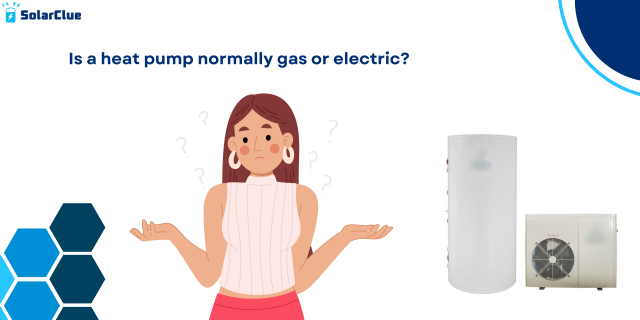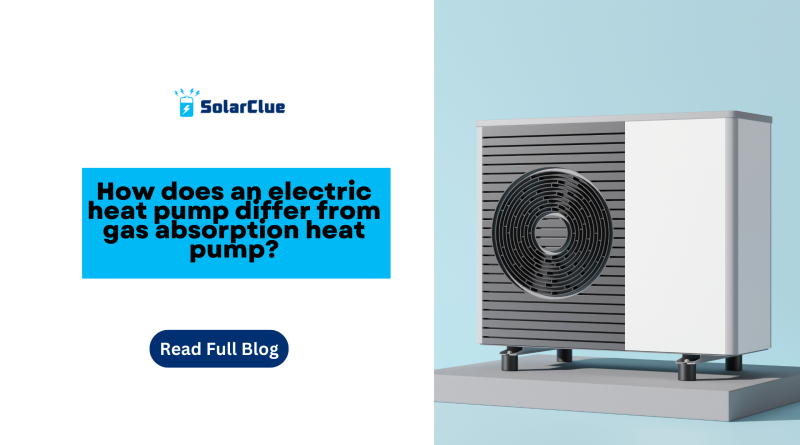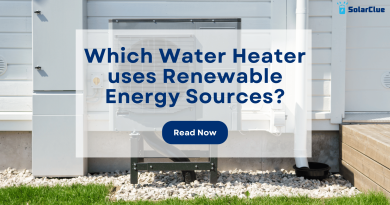Gas Absorption Heat Pump vs Electric – Which is better?
Whenever we talk about energy saving water heaters, heat pump is always our choice. But have you heard about gas absorption heat pumps?
In this blog, we would discuss gas absorption heat pumps. We will discuss in detail, how they differ from electric heat pumps, and which one should you prefer for your home?
What is a Gas Absorption Heat Pump?
A gas absorption heat pump is also known as gas fired heat pump. It is a water heating system that utilizes a gas-fired generator to power a refrigeration cycle. Unlike traditional electric water heaters or gas-fired tankless heaters, gas absorption heat pump water heaters use a thermally driven process to transfer heat from the surrounding air or water source to heat water.
How Does a Gas Heat Pump Water Heater Work?
The working principle of a gas heat pump water heater is based on the absorption refrigeration cycle. It consists of four main components:
1. Evaporator
The evaporator is the component that absorbs heat from the surrounding air or water source. It contains a refrigerant that evaporates, absorbing heat from the environment in the process. The evaporator is typically an air-cooled or water-cooled heat exchanger.
2. Absorber
The absorber is where the refrigerant vapor from the evaporator is absorbed into a liquid solution, typically a lithium bromide-water solution. This process releases heat, which is then transferred to the hot water supply or space heating system.
3. Generator
The generator is a critical component powered by a gas-fired burner. It separates the refrigerant vapor from the liquid solution by applying heat, enabling the refrigerant to circulate through the system.
4. Condenser
In the condenser, the refrigerant vapor released from the generator is condensed back into a liquid state. The heat released during this phase change is transferred to the water storage tank or space heating system, providing the desired heating.
The process of producing hot water in a gas absorption heat pump water heater:
- The evaporator absorbs heat from the surrounding air or water source.
- The refrigerant vapor is then absorbed by a solution in the absorber, releasing heat in the process.
- The heated solution is pumped to the generator, where it is heated further by a gas-fired burner.
- The refrigerant vapor is separated from the solution and condensed in the condenser, transferring heat to the water storage tank.
- The condensed refrigerant returns to the evaporator, and the cycle continues.
Gas water heater vs heat pump – How do they differ?
While both gas absorption and electric heat pump water heaters serve the purpose of heating water, their operating principles differ significantly. But how a heat pump works differs from a gas fired heat pump.
Electric heat pump water heaters use electricity to power a compressor, which circulates the refrigerant through the system. They are highly efficient and can provide hot water by extracting heat from the surrounding air.
On the other hand, gas absorption heat pump water heaters rely on a gas-fired generator to drive the refrigeration cycle. They can be more cost-effective in regions with lower natural gas prices.

Is a Heat Pump normally Gas or Electric?
In most residential applications, electric heat pump water heaters are more common than gas absorption heat pump water heaters. Electric heat pump water heaters are widely available, easier to install, and can be more energy-efficient in certain scenarios.
However, gas absorption heat pump water heaters can be a viable option in areas where natural gas is readily available and affordable, and where the climate allows for efficient operation throughout the year.
Electric heat pump vs gas – Which one should you prefer?
While gas absorption heat pump water heaters offer an efficient hot water solution, electric heat pump water heaters are generally considered the preferred choice for several reasons:
- Energy efficiency: Modern electric heat pump water heaters can be highly energy-efficient, resulting in lower operating costs and reduced environmental impact. So, this leads to a cuts in electricity bill.
- Maintenance: Electric heat pump water heaters have fewer moving parts, making them easier to maintain and potentially extending their lifespan. So, if the maintenance is done on regular intervals, it is cost effective.
- Indoor air quality: Electric heat pump water heaters do not produce combustion byproducts, ensuring better indoor air quality. Therefore, an electric heat pump is normally preferred.
Conclusion
While the initial cost of installing an electric heat pump water heater may be higher than a gas absorption system, the long-term energy savings and versatility often make electric heat pump water heaters the preferred choice for Indian households.
You can look for the best Heat Pump Water Heaters at affordable prices at SolarClue®. SolarClue® is an online marketplace for solar energy products like Solar Street Lights, Solar Panels, Solar Water Heaters and many more. You can avail discounts up to 50% on the products.




